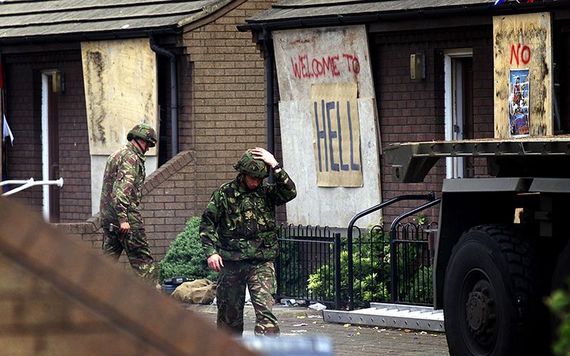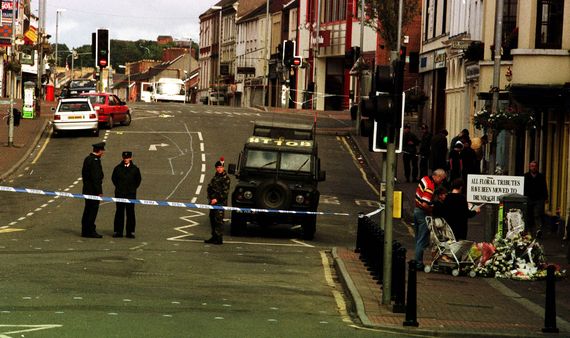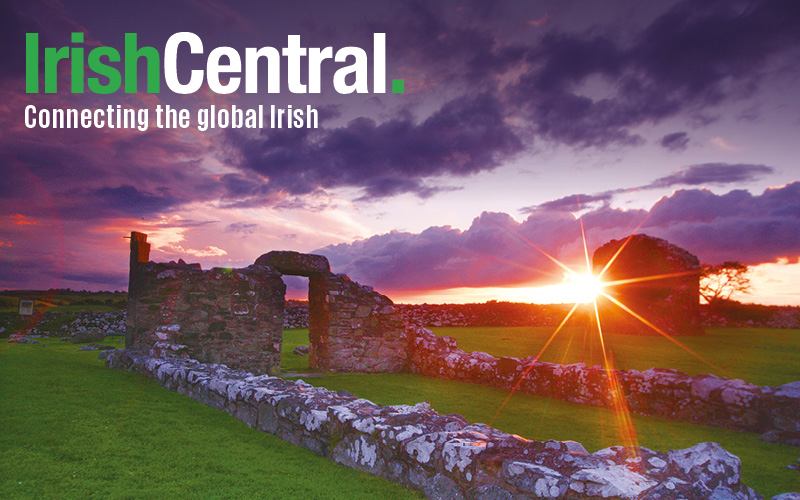As an immigrant, I will probably always see America through an outsider's eyes. It can give me a perspective that insiders, those who accept the status quo here because it's all they've known don't always share.
When I was growing up in the north of Ireland, violent conflict was the top note of our daily lives and unforeseen dangers were ever present, even across the border in Donegal.
In fact, The Troubles were so much a part of our lives that at times we almost stopped seeing them, as they became a sort of background noise that you had to stop hearing in order to go on.
I'd wake to the sound of breaking news reports of fresh horrors, read in the deliberately impartial deadpan voice of our national broadcasters, who were determined never to take sides.
A suspect device had exploded, a policeman was shot, two pedestrians were killed, an explosion in a cafe has claimed three lives, a fire bomb has gutted a supermarket, a sniper has killed a British soldier, two boys were killed during an exchange of gunfire.
All of these reports were read in an intentionally neutral voice, as if the reporter was reading the national forecast, as if the taking of lives was as unremarkable as a change in the weather conditions.

June 9, 2002: British Army patrol the streets in East Belfast. Increased violence had prompted a barrier to be erected between Loyalist and Nationalist areas. (Getty Images)
Too much horror if it goes on too long can lead to an emotional numbness, I discovered. People begin to glaze over from a diet of death. There is a threshold that when it's passed, causes a kind of paralysis that can blind and deafen people. They can become frozen. They can tune out and turn off.
It's incredible what you can find yourself getting used to if it happens too much. Like abuse or bullying or neglect, people can start to factor these things into their daily lives without too much objection if they're all they have ever known.
But rationalizing horror is also a way to help it continue. You may not mean to do it, but that is the end result. Things are the way they are, you tell yourself. This all started so long ago. What can I do to change anything? It's all so much bigger than me. I'm just one little voice in the wilderness.
I used to think like this. I used to think that the forces that shaped our destinies were remote and unassailable as the gods on Mount Olympus. The most that you could hope for in this world was to be left alone and to be passed over by them, let some other poor sap stick his neck out instead.
The thing we were studiously not thinking about, but the thing that was ever present, was death. Of course it was. Gazing up at us from the latest newspaper reports, taking over our TV screens, keeping pace with us every time we went to the shops or to a disco or drove through unfriendly streets with the wrong car registration.
I was very surprised when The Troubles turned out to be a decades-long preparation for a new life in the United States of America. I was surprised by how many chilling parallels I would start to see between how I had grown up there and how things have started going here.
In the north, the presence of death had begun to be carefully stage-managed. After a bomb like the one in Omagh in 1998 that killed children from my town, news reports kept the cameras away from the bloody streets and they kept the language neutral. We had learned by that point how to speak about the unspeakable.

August 22, 1998: The British army watch as flowers are left at the scene where a Real IRA car bomb exploded at the shops in Omagh Town, killing 28 people, a week earlier. (RollingNews.ie)
But after the latest mass shootings in America – and 2023 has been a record year for them, with about one a week happening since January 1 – I have noticed that the same social numbness I saw all around me growing up has taken deep root here.
The first four months of U.S. gun violence in 2023, as of #May1st:
•5,971 gun deaths
— The Gun Violence Archive (@GunDeaths) May 1, 2023
•11,035 gun injuries
•184 mass shootings
•290 children shot
•1,702 teenagers shot
•359 incidents of defensive gun use
•454 unintentional shootings
~7,986 suicides [CDC estimate]
Worse, the distancing language and the neutral reporting styles employed to convey each fresh round of horror really echoes now. A shooter, a cache of weapons, a military arsenal, a police investigation, a standoff, the suspect described as immobilized instead of killed.
Mass killings in America, 2023
(7/?) pic.twitter.com/WO4E4jzAEp
— Dave Jorgenson ? (@davejorgenson) May 1, 2023
What will wake us all up to the horror we are living through here? What will cause a revulsion so deep we have no choice left but to act?
In Ireland, the Omagh bomb killed young children with it all still ahead of them. It redoubled our efforts to find and maintain a lasting peace.
In America, I think people also need to look cold, un-sanitized reality in the face. They need to see what mass shootings with an AR-15 can do to their children's bodies.
They need to face both reality and themselves and the now ubiquitous presence of death in their lives. And they need to act to stop it.




Comments